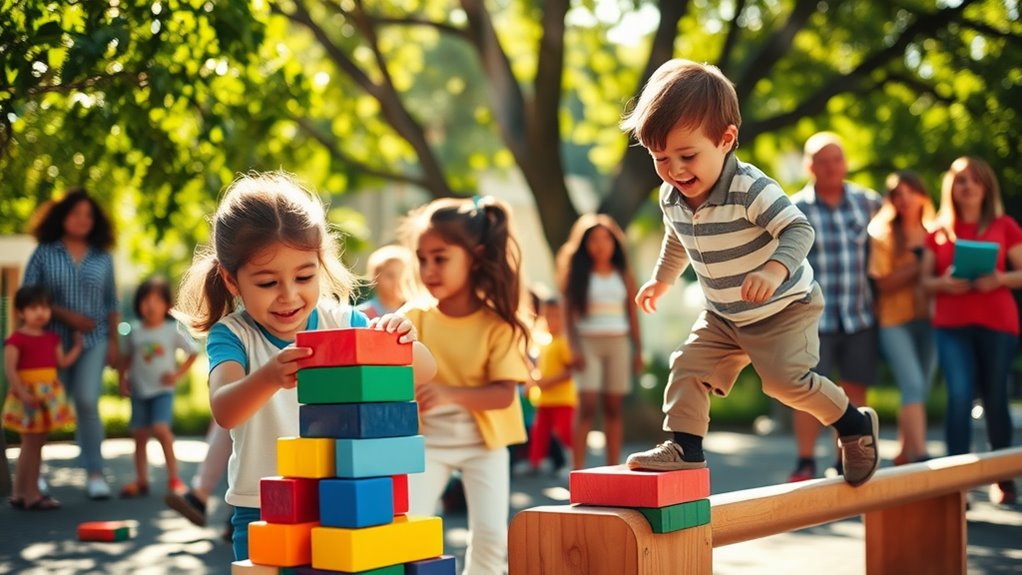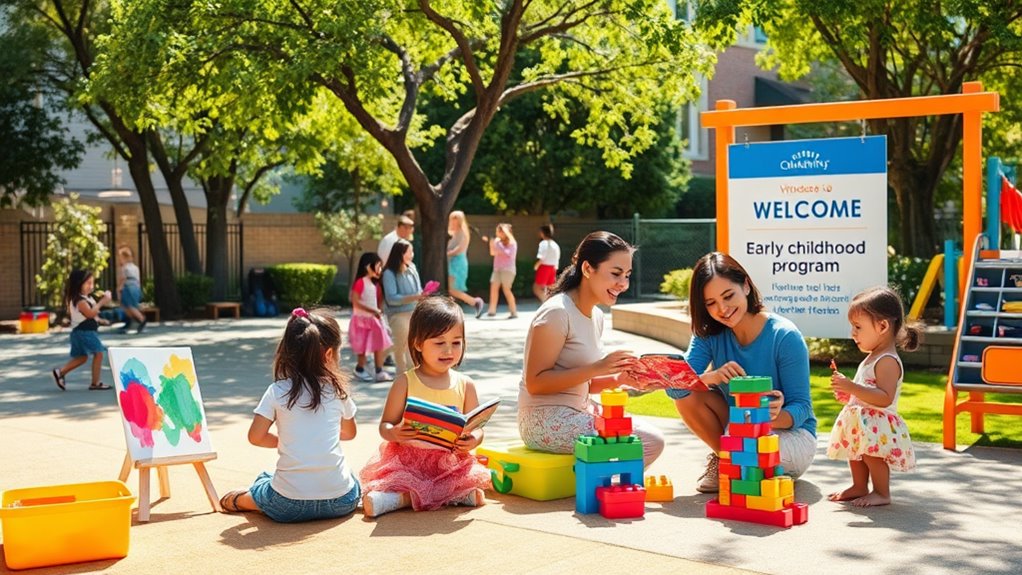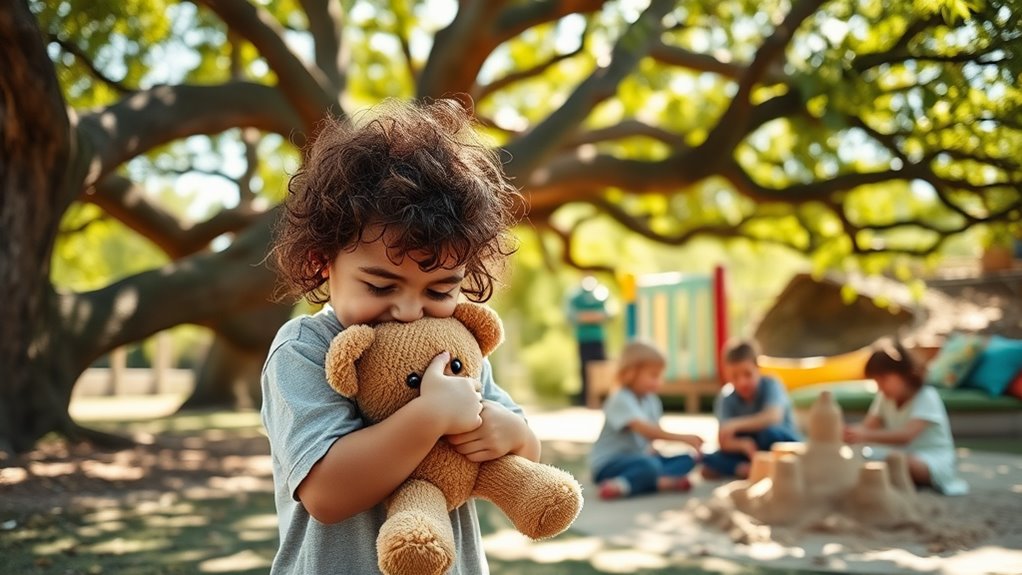The Early Learning Myth That’s Holding Your Child Back!
Many parents think their child must master academic skills early, but this early learning myth can actually hold them back. It creates unnecessary pressure, stifling creativity and critical thinking. Instead, play-based learning should be prioritized, as it fosters problem-solving abilities and emotional intelligence. Every child has unique learning styles, and recognizing those can enhance their educational experience. By focusing on lifelong learning over early mastery, you nurture a love of learning that lasts. Consider how embracing a more holistic approach can benefit your child, and stick around to discover more insights into fostering their development.
Common Misconceptions in Early Education
While many people believe that early education is primarily about rote memorization, this misconception overlooks the importance of fostering critical thinking and creativity in young learners. You might think that repeating facts and figures is the best way to prepare your child for future academic success, but this approach can stifle their natural curiosity. Instead of just memorizing, encourage your child to ask questions and explore ideas.
Another common myth is that early education should be strictly academic. It’s easy to assume that kids should dive into math and reading from a young age, but play-based learning is just as crucial. Through play, children develop problem-solving skills, social interactions, and emotional intelligence. When you prioritize play, you’re setting the foundation for lifelong learning.
Additionally, some believe that early education is a race. This mindset can lead to unnecessary stress for both you and your child. Instead, focus on encouraging a love for learning and exploring interests at their own pace. By debunking these misconceptions, you’ll create a more enriching environment that nurtures your child’s unique abilities and talents.
The Pressure to Perform Early
Many parents feel an overwhelming pressure to ensure their children excel academically from a young age. You might find yourself caught in a whirlwind of expectations, worrying that if your child doesn’t master reading or math before kindergarten, they’ll fall behind. This pressure often stems from societal norms and the belief that early achievement guarantees future success. However, pushing your child to perform early can lead to stress and anxiety, both for you and them.
When you prioritize early academic performance, you risk overlooking your child’s unique developmental timeline. Every child is different, and they’ll reach milestones at their own pace. Instead of focusing solely on grades or test scores, consider nurturing their curiosity and love for learning. You may notice that children who are allowed to explore their interests often develop a deeper understanding and passion for knowledge.
The Role of Play in Learning
Play serves as a powerful catalyst for learning, providing children with a natural way to explore and understand the world around them. When kids engage in play, they’re not just having fun; they’re developing critical cognitive, social, and emotional skills. Through imaginative scenarios, they learn problem-solving and decision-making, while also enhancing their creativity.
In a playful environment, children interact with peers, fostering social skills like cooperation and communication. These interactions teach them how to navigate relationships, share resources, and resolve conflicts. As they role-play different situations, they gain empathy and perspective-taking abilities, crucial for their emotional development.
Moreover, play encourages curiosity and risk-taking. When children experiment with materials or ideas, they learn to think independently and develop resilience. If they fail, they’re likely to try again, reinforcing the idea that mistakes are a natural part of learning.
As a parent or caregiver, you can nurture this vital aspect of learning by providing opportunities for open-ended play. Whether it’s building with blocks, creating art, or engaging in outdoor activities, you’re helping your child build a foundation for lifelong learning. Embrace play as an essential component of your child’s development.
Individual Learning Styles Matter
Understanding how children learn can enhance the benefits of play. Each child absorbs information differently, and recognizing these individual learning styles can help you tailor their experiences for maximum engagement. By understanding your child’s unique learning preferences, you can create a more supportive and stimulating environment.
Here’s a quick overview of common learning styles:
| Learning Style | Characteristics | Ideal Activities |
|---|---|---|
| Visual | Learns best through images and diagrams | Drawing, videos, and charts |
| Auditory | Prefers listening and verbal instructions | Storytelling, music, and discussions |
| Kinesthetic | Needs hands-on experiences | Building, role-playing, and crafts |
Impact of Standardized Testing
Standardized testing has a significant impact on early learning, shaping not only curriculum but also how children perceive their own abilities. When you think about it, these tests often create a narrow focus on specific skills, which can limit a child’s natural curiosity and love for learning. Here’s how standardized testing affects your child’s educational experience:
- Curriculum Narrowing: Teachers may prioritize test preparation over innovative teaching methods, stifling creativity.
- Stress and Anxiety: Your child might feel immense pressure to perform well, leading to anxiety that can hinder their ability to learn effectively.
- Self-Esteem Issues: When children don’t meet testing benchmarks, they might internalize a sense of failure, negatively impacting their self-worth.
- Limited Skill Development: Standardized tests often emphasize rote memorization rather than critical thinking or problem-solving skills, which are essential for lifelong learning.
As you navigate your child’s education, it’s crucial to recognize these impacts. By advocating for a more holistic approach to learning, you can help foster an environment where your child thrives, not just in tests, but in life.
Evidence-Based Approaches to Learning
While standardized testing can limit children’s natural curiosity, evidence-based approaches to learning offer a refreshing alternative that nurtures their development. These methods focus on what research shows truly enhances learning, emphasizing engagement and real-world application rather than rote memorization.
You can create a rich learning environment by incorporating activities that promote exploration and critical thinking. For instance, hands-on experiences, like science experiments or interactive storytelling, can make complex concepts more relatable and enjoyable for your child.
Additionally, tailored instruction based on individual needs can significantly boost a child’s confidence and understanding. By using formative assessments, you can gauge where your child excels and where they might need extra support, allowing you to adapt your teaching style accordingly.
Encouraging collaboration through group activities also fosters social skills and teamwork, essential components of a well-rounded education. Remember, the goal is to cultivate a love for learning, not just to prepare for tests. By implementing these evidence-based strategies, you’re setting your child on a path to lifelong curiosity and success, giving them the tools they need to thrive in an ever-changing world.
Nurturing a Growth Mindset
Fostering a growth mindset is essential for helping children embrace challenges and learn from setbacks. When you nurture this mindset, your child will start to see difficulties as opportunities for growth rather than obstacles. Here are four practical ways to encourage a growth mindset in your child:
-
Praise Effort, Not Just Results: Acknowledge the hard work and perseverance your child puts into tasks, rather than solely focusing on the end result.
-
Encourage Risk-Taking: Create a safe environment where your child feels comfortable taking risks. Remind them that mistakes are part of the learning process.
-
Model a Growth Mindset: Share your own experiences with challenges and how you overcame them. Show them that learning is a lifelong journey.
-
Teach Problem-Solving Skills: Instead of providing immediate solutions, guide your child in brainstorming and evaluating different strategies for overcoming challenges.
Frequently Asked Questions
How Can I Identify My Child’s Unique Learning Style?
To identify your child’s unique learning style, observe how they engage with different activities. Notice if they prefer visual aids, hands-on experiences, or listening. Experiment with varied methods and see which resonates most with them.
What Age Should My Child Start Formal Education?
There’s no one-size-fits-all answer for when to start formal education. Generally, kids begin around age five, but consider your child’s readiness. Pay attention to their social, emotional, and cognitive development before making a decision.
Are There Benefits to Delayed Academic Learning?
Yes, there are benefits to delayed academic learning. It allows your child to develop social skills, emotional maturity, and a love for learning. This foundation can lead to greater success and engagement in later academic pursuits.
How Do I Balance Play and Structured Learning?
To balance play and structured learning, schedule specific times for both. Encourage exploration through play while integrating learning activities. This way, you’ll foster creativity and curiosity without sacrificing important academic skills your child needs.
What Resources Support a Growth Mindset in Children?
To support a growth mindset in children, you can use books like “The Power of Yet,” educational games that encourage resilience, and activities that celebrate effort over results. Encourage them to embrace challenges and learn from mistakes.





